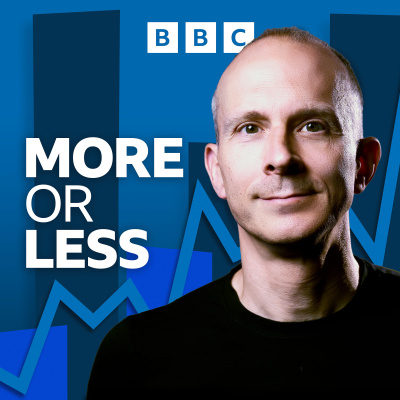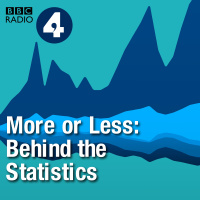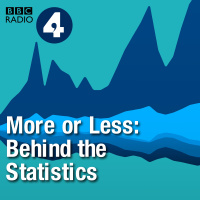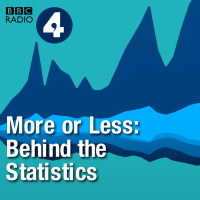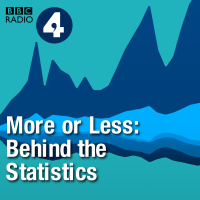Sinopsis
Tim Harford and the More or Less team try to make sense of the statistics which surround us. From BBC Radio 4
Episodios
-
Numbers of 2012
28/12/2012 Duración: 27minA guide to 2012 in numbers - the most informative, interesting and idiosyncratic statistics of the year discussed by More or Less interviewees.
-
Gun Statistics
24/12/2012 Duración: 09minTim Harford investigates the numbers in the debate on firearms deaths, and discovers the mathematics of juggling. This programme was first broadcast on the BBC World Service.
-
Fact-checking US gun crime statistics
21/12/2012 Duración: 27minTim Harford investigates gun crime statistics in the US. Plus, why death is not always the one hard fact that’s hard to fudge; the average age of first-time buyers; whether chocolate makes you clever; the statistical paradox of road collisions caused by deer; and the maths of juggling. Producer Ruth Alexander
-
WS MoreOrLess: What is "rare"?
17/12/2012 Duración: 09minThis week: What is ‘rare’? When we say something is rare what do we mean? Lightning strikes which typically kill three people a year in the UK are often described as rare but how do we square that with a condition like motor neurone disease which is also described as rare yet kills 1500 people a year in the UK. Also we speak to Nassim Taleb about his book Anti-fragile.
-
The Census and what does 'rare' mean?
14/12/2012 Duración: 27minWhy was the estimate, in 2003, for Eastern Europeans coming to the UK so wrong? Which is better when communicating information words or numbers? Nassim Taleb explains anti-fragility And we'll debunk the oft quoted 'you're never more than 6ft from a rat'
-
World Service: Africa GDP & Royal twins
10/12/2012 Duración: 09minWhere does Nigeria’s plan to revise its GDP leave our understanding of growth in Sub-saharan Africa? And what is the chance of the Duchess of Cambridge having twins given she has severe morning sickness.
-
Radio 4: Royal Twins & Autumn Statement
07/12/2012 Duración: 27minIn light of the Royal pregnancy Tim Harford asks what severe morning sickness tells us about the chances of having twins. Yan Wong helps him look at the figures. We disentangle the Chancellor' Autumn Statement and ask: where is the economy really at? As Nigeria prepares to revise its GDP statistics with an expected jump of 40-60%, we ask how reliable are African GDP statistics? Another Daily Telegraph headline comes under scrutiny. And we return to our Lego tower and look at how Lego can be used to teach maths with Eugenia Cheng of Sheffiled University.
-
More or Less: How reliable is Kevin Pietersen?
03/12/2012 Duración: 09minKevin Pietersen has been widely praised as one of the best England batsmen of the current era and possibly of all time. But in the first test match he only scored 19. So can England really not do without him? Also why is Zero an even number?
-
More or Less: Opinion polling, Kevin Pietersen, and stacking Lego
30/11/2012 Duración: 24minOn More or Less this week Tim Harford looks at three polls carried out to gauge the public’s opinion on press regulation gave vastly different answers despite being carried out by the same polling company. Tim talks to Peter Kellner, President of online polling company YouGov. Would you send Kevin Pietersen out to bat if your life depended on him scoring a century? Have two thirds of millionaires really left the country as claimed by the Daily Telegraph this week? What percentage of drinks might be affected by the introduction of a minimum price for alcohol. And how high could you build a Lego tower before the bottom brick collapses? Ruth Alexander dons her safety goggles to find out?
-
Fergie Time
26/11/2012 Duración: 09minThis is the first in the new series of the programme. There’s a well-established idea that Manchester United get more added time than every other Premier League team. More or Less looks at the numbers behind this so called ‘Fergie Time’. Do Manchester United get more injury time than other top teams when they’re drawing or losing?
-
Ash Die Back and Fergie Time
23/11/2012 Duración: 27minThis is the first in the new series of the programme. Tim Harford has been busy felling some ash tree statistics. He asks whether the UK could lose 30% of our woodland trees and did the ash die back disease really kill 90% of ash trees in Denmark? Plus, there’s a well established idea that Manchester United get more added time than every other Premier League team. More or Less looks at the numbers behind this so called ‘Fergie Time’. Do Manchester United get more injury time than other top teams when they’re drawing or losing?
-
Brain Food and Bacteria
19/11/2012 Duración: 09minThere's not an obvious link between chocolate and Nobel prizes, but this did not stop news outlets around the world reporting the amount of chocolate a country consumes influences the number of Nobel prizes they will win. In many cases the scientific study was reported without question or comment. Ruth Alexander asks what this story tells us about the way the media reports scientific studies, and why the correlation between the two might be so strong. Also – it's often said that chopping boards or dishcloths have many more bacteria than toilet seat but is this really true?
-
Voodoo polling? Predicting the US election
12/11/2012 Duración: 09minThis week Ruth Alexander looks at the other winner the US elections. Blogger and pioneer of aggregated polling, Nate Silver, predicted the outcome of the vote in every state one better than 2008. Others who have tried similar methods have also done well. Is this the dawn of a new era of poll prediction or just luck? Also, what effect did Hurricane Sandy have on death rates in places it hit and how did they differ from a normal day.
-
Is America’s conviction rate really 99.5%?
05/11/2012 Duración: 09minConrad Black has claimed that 99.5% of prosecution cases in America end up in convictions. Is it really this high? We try to estimate how this compares to the number of convictions in other parts of the world.
-
Predicting L'Aquila Earthquake: is it right to blame the scientists?
29/10/2012 Duración: 09minThis week six scientists and one ex-government official were sentenced to prison for multiple manslaughter following the L’Aquila earthquake in Italy. Part of the case against them was the falsely reassuring comments they made before the earthquake struck. Will this deter scientists from giving advice in the future?
-
Life-saving economics
22/10/2012 Duración: 09minProfessor Al Roth tells Tim Harford about the work for which he has just been awarded the 2012 Nobel Memorial Prize in Economic Sciences.
-
Predicting the global population
15/10/2012 Duración: 08minPredicting the global population: does anyone really know what’s going to happen?
-
Predicting the Presidency
08/10/2012 Duración: 09minNate Silver tells us who will win the 2012 US election - and how he knows.
-
Plenty more fish in the sea?
01/10/2012 Duración: 09minOnly 100 cod are left in the North Sea according to newspapers. Is this the most wrong headline in More or Less history?
-
Factchecking America
24/09/2012 Duración: 09minUS Presidential Election factchecked. Is Mitt Romney right to say that 47% of Americans pay no tax? And how many jobs has President Obama really created?
